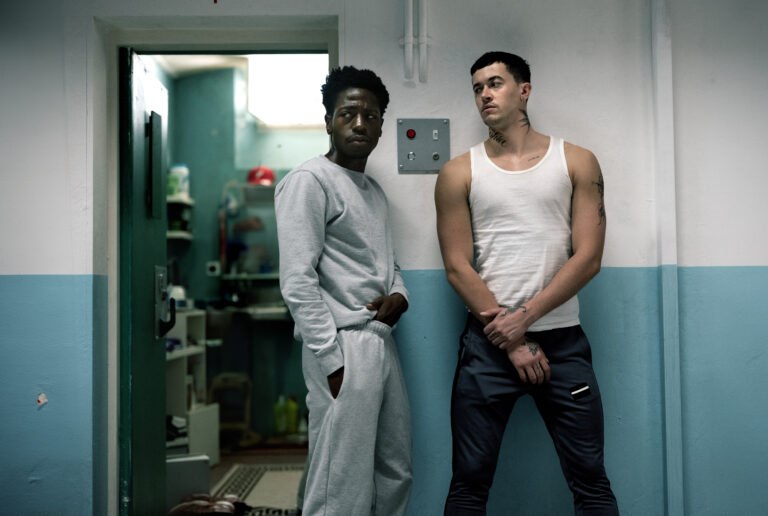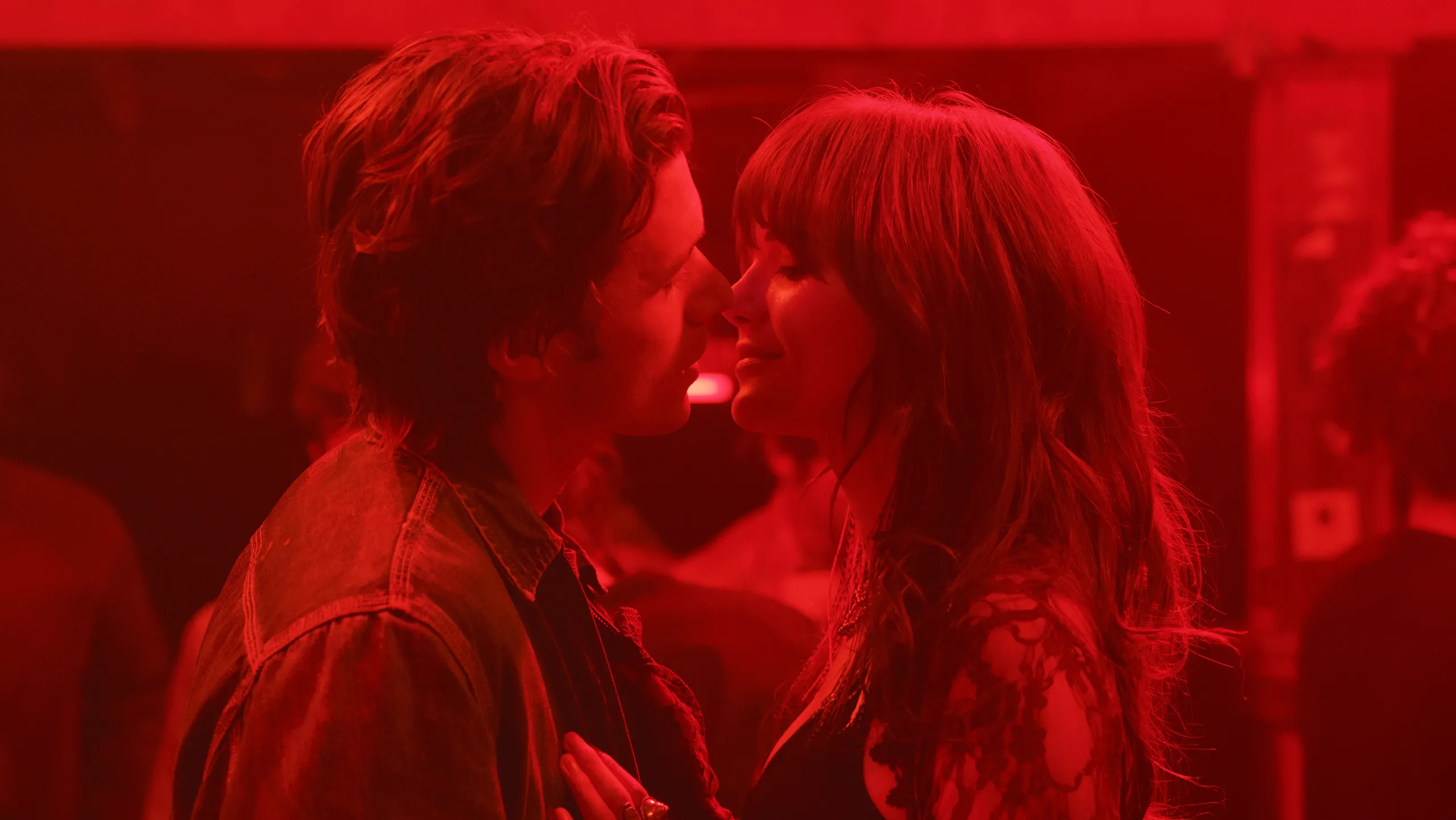
Interesting leading men and women dominate this unusual dispatch, one that gathers films that have almost nothing in common on paper, itself a testament to the variety of styles one can find at a festival as broad-reaching as TIFF.
The best of the three is the intense, unforgiving “Wasteman,” another evidence exhibit in the case that David Jonsson is one of the most remarkable actors of his generation. From “Industry” to “Rye Lane” to “Alien: Romulus” to this searing performance, he’s become someone who you don’t want to miss, no matter the project. The film around him sometimes falters by telling a relatively simple tale, but that simplicity allows both Jonsson and co-star Tom Blyth to do a lot of character work within the confined space of this intense prison drama.
Director Cal McMau, working from a script by Hunter Andrews & Eoin Doran, opens his film with a tone-setting bit of violence as we see a prison beatdown through what looks like a phone recording from a fellow inmate. The guys who run the UK prison that this film will never leave don’t take kindly to being double-crossed and they brutally beat a man, ending the attack by slamming a TV on his head. This means Taylor (Jonsson) is going to need a new cellmate, who comes in the form of Dee (Blyth, having a hell of a year with “Plainclothes” from Sundance and Claire Denis’ “The Fence,” also at TIFF). Taylor has survived this lawless place by disappearing, quietly doing favors for the power players as he numbs himself with drugs. Dee threatens that reality at the precise wrong time as Taylor learns that he may get early parole, possibly even reconnecting with the son he’s never known. For the first time in years, maybe ever, Taylor allows himself to hope, and Jonsson is simply phenomenal at conveying the arc of a man who sees a glimmer of light after living for so long in darkness.
Blyth knows to play the extrovert to Jonsson’s introvert, going broad with his sociopathic character. Even as Dee befriends Taylor, even helping him connect with his son, Blyth sells the kind of guy who has no allies that he won’t sell out to further his interests. That “Wasteman” arrives at a place wherein Taylor’s new ally becomes his greatest hurdle to a normal life again is a bit predictable, but there’s a spark that the film gains from these two young performers that’s never extinguished.
Speaking of great performers, we don’t talk enough about how Lesley Manville is one of the best working actresses. Sure, she got an Oscar nomination for “Phantom Thread,” but she’s one of those performers that’s quite literally never bad, and quite often great, even in a small part such as in last year’s Apple TV+ drama “Disclaimer.” She is simply spectacular in Kasia Adamik’s “Winter of the Crow,” dragging us along on this Kafka-esque journey into the dark heart of a country in violent turmoil. This is an unusual film that’s sometimes frustrating in its storytelling—it really sags at the hour mark—but Manville holds it together until the stunning final shot, one that’s among my favorites of the year.
Manville plays Dr. Joan Andrews, a clinical psychologist who has been asked to present her controversial research to a group of students at the University of Warsaw in December 1981. Historians will know what a tumultuous time this was in the Eastern European country, and Andrews becomes caught up in a wave of martial law designed to quell the Solidarity movement. Before she knows it, and without her luggage, she’s stranded in a completely dark, freezing, isolated Warsaw. She finds herself allied with an activist named Alina (a very good Zofia Wichłacz) and a witness to a murder, one that she documents with her handy Polaroid camera. Suddenly, Dr. Andrews isn’t just on the run, she’s got something that could shape world history.
Working loosely from a short story by Nobel Prize winner Olga Tokarczuk, Adamik has made a Polish noir, a film that recalls Orson Welles and Alfred Hitchcock in its telling of international intrigue and how an intrepid foreigner falls into it. Tomasz Naumiuk’s cinematography is so dark that it sometimes looks shot through gauze, but the approach works. You feel the cold in a place in which turning on a light could alert the authorities to your existence. I liked most of what “Winter of the Crow” was doing, despite that aforementioned lag, and then the wonderful Tom Burke (“Mad Max: Fury Road”) showed up for a truly memorable scene as a British ambassador and I was hooked for good.

I was never hooked on the frustratingly facile “Charlie Harper,” a movie that recalls last year’s TIFF premiere “We Live in Time” in its chronological gamesmanship in a genre (romantic drama) that doesn’t usually entertain it. While I felt that movie rose above its structure through the sheer power of its performers, I spoke to a number of people who hated the very construct of the film. Now I know how they feel. Although I’m not sure “Charlie Harper” would have worked any better told traditionally, either in structure or in non-fluctuating aspect ratios.
“I know how it started. I know how it ends. When I think about the middle, everything is scrambled,” says Harper (Emilia Jones, much better in HBO’s current “Task”). It’s only one of many lines in “Charlie Harper” that draws attention to itself in how it describes what you’re watching. There’s another about the power of nostalgia that gets said twice, just in case you missed it. Charlie (Nick Robinson) and Harper had a five-year relationship that included a move to New Orleans, her ascendance as a chef there, and his bout with alcoholism. All of it is superficial, manufactured highs and lows that highlight the strings of the screenwriter using these two performers as melodramatic puppets. It gets so drenched in pretension that the shifting aspect ratios for the different jumbled eras of their relationship just add to that overwritten and overdirected air.
Favorite songs, nights reading poetry, every conversation drenched in self-importance—too little of “Charlie Harper” actually feels as messy as human memory. The concept of a how capable we are of jumbling memories in the formative relationships of our lives—especially in our immature twenties—is a smart one, but the writing needed to work from character not from cliché, and even Jones, who’s always solid, gets lost in the cogs of this plot machine. She’ll move on and the debut filmmakers will certainly do so as well—there’s ambition here that I’m curious to see in a follow-up project—and everyone will look back on this film the way that Charlie and Harper do their relationship: a learning experience.
Source link

